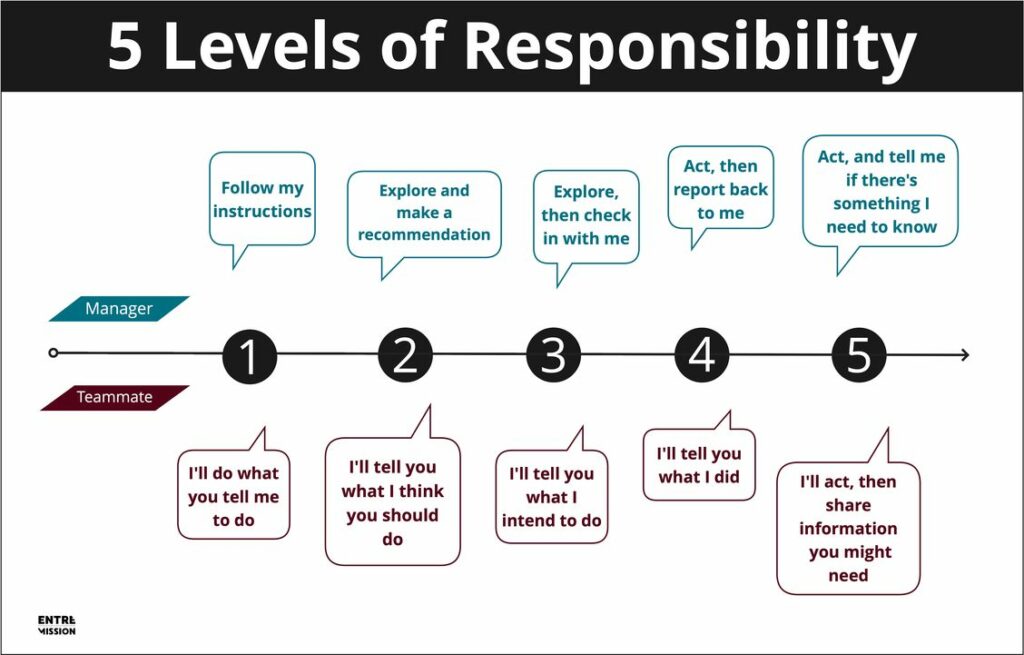The Organizer #7 | Leadership
| How do I delegate and share responsibility? | Use the Five Levels of Delegation to share responsibility with your team and build a culture of leadership at every level of your organization. |
Good leaders cultivate leadership at every level
When you think about leadership, do you also think about sharing responsibility and delegation? Or do you think of heroes and independent visionaries?
Leadership sometimes feels like an over-used buzzword, meaning whatever you want it to mean, and loaded with cultural baggage.
I heard someone say recently that the concept of “leadership” became popular when American colleges figured out people would pay more to become “leaders” than “managers”. It’s a cynical take on an important topic.
Whatever its origins, leadership is genuinely important. We won’t get a more just world or a sustainable world by accident. It won’t happen if we don’t work for it. We can’t work for it if we don’t plan for it. And we can’t plan without leadership.
So, we have to talk about leadership and how to lead good work.
A leader isn’t supposed to do everything
For a lot of foolish reasons, leaders in the nonprofit sector are often expected to do everything themselves.
Have you read the job description of a typical Executive Director or CEO lately?
> Design programs? Check.
> Write grant proposals? Check.
> Organize events? Check.
> Liaise with the board? Check.
> Manage staff? Check.
> Pay bills? Check.
> Engage the community? Check.
> Set up an office? Check.
> Interact with all levels of government? Check.
> Ensure regulatory compliance? Check.
> Speak to the media? Check.
The list can go on and on (and on and on and on).
A leader’s job shouldn’t be to do everything themselves.
Once you pass the “founding” stage and have a team, a leader’s job is to create conditions that transform effort into impact.
In other words, leaders make it possible for other people to do important work. To do this in the social impact space, they have to share responsibility.
Sharing responsibility
Responsibility means making decisions, having influence, having authority, having a sense of ownership.
Leaders who share responsibility and practice intentional delegation will build stronger teams. Sharing responsibility means some of the weight comes off the leader’s shoulders. It means other people have an opportunity to feel connected, engaged, and satisfied by their efforts.
There are 5 levels of responsibility. From lowest to highest, they are:
- Follow instructions.
- Make a recommendation to someone else.
- Develop a recommendation, then get approval before acting.
- Act, then report on your actions.
- Act, and report or share information if needed.
This graphic shows the 5 stages. A manager’s perspective is on the top line. The perspective of the person being delegated to (“the teammate”) is below.

In the social impact world, sharing responsibility isn’t just a nice thing to do. It ensures accountability to the community and legitimacy. It’s crucial to creating actual, meaningful, lasting impact.
Sharing means never claiming it as yours in the first place
Responsibility can feel an awful lot like power. And power can be an exciting, thrilling, alluring thing. Avoid the temptation to feel important.
People who do social impact work are custodians of a cause, not the centre of it. Responsibility “for” the cause is not one person’s to keep, to give out, or to take back.
Good leaders — the kind we need more of in this world — focus on building strong organizations and strong teams. They know that their success should be determined by the success of the people around them. They recognize and embrace their connection to others.
This doesn’t mean that you don’t matter, of course. If you really want to be a force for good, you should be ambitious. You should develop your skills, test your talent, and push boundaries. The better you are in your role — whatever your level of responsibility — the better off the cause will be.
Try for yourself
This week, try paying attention to the way responsibility is acknowledged in your team.
This is a helpful exercise if:
- The weight of your day-to-day responsibilities keeps you from strategic priorities and you need to find ways to change
- You feel uncertain about your role and want some clarity
- You intend to play a leadership role in the future
Ask yourself questions like these:
- When do I follow instructions?
- When do I give instructions?
- When do I make recommendations?
- When do I make decisions?
- When do I report to others?
- When do they report to me?
Understanding these patterns helps you to understand your team and your role. It helps you figure out how to grow, personally and as a group. Most importantly, it builds a culture of leadership.
How to delegate
- Download your copy of the Five Levels of Delegation from Entremission
The Organizer is a newsletter for people working to create equitable and sustainable communities. Whether you are part of a nonprofit, a charity, or a social enterprise, this newsletter is for you.
Each edition, we explore one aspect of social impact work. We answer a common “How do I …?” question, and we tell you about a tool that will help make your work a little easier. Subscribe for free at Entremission.com.